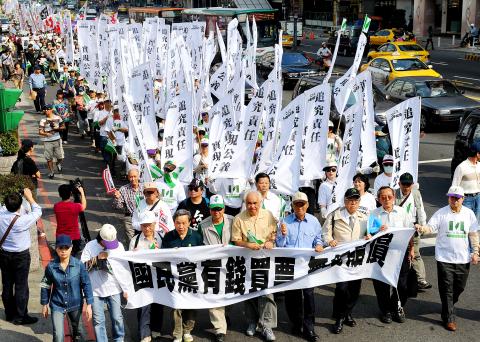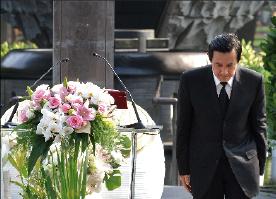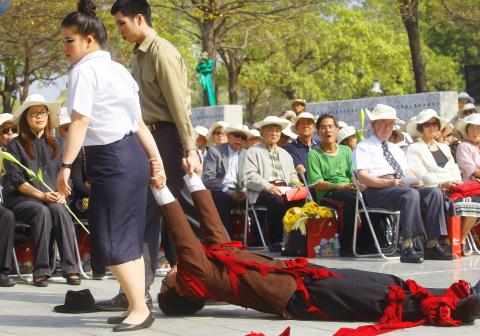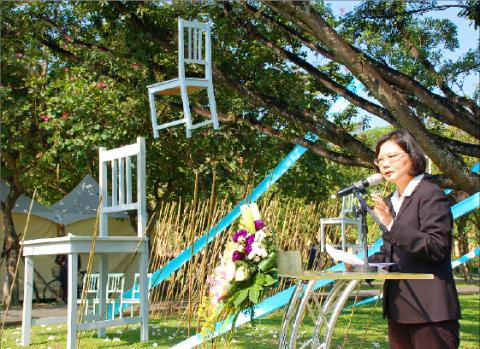The National 228 Memorial Museum opened to the public yesterday to mark the 64th anniversary of the 228 Incident, with President Ma Ying-jeou (馬英九) pledging to keep investigating the massacre in which thousands of Taiwanese were killed by Chinese Nationalist Party (KMT) troops beginning on Feb. 28, 1947.
Ma said it was appropriate for his government to address the matter, as “the government played the leading role in the 228 Incident.”
“It is the right thing to do,” he said as he left the museum.

Photo: Liao Chen-huei, Taipei Times
Located on Nanhai Road in Taipei, the museum is housed in a building that was constructed in 1931 during the Japanese colonial era. It has served as a school dormitory, Taiwan Provincial Assembly offices and the American Institute in Taiwan cultural center.
Amid somber ceremonies nationwide, about 1,000 protesters, led by the Taiwan 228 Care Association and the Taiwan National Alliance, marched in Taipei to call on the KMT to take responsibility for the 228 Incident.
Former Democratic Progressive Party (DPP) chairman Yao Chia-wen (姚嘉文), Reverend William Luo (羅榮光) of the Presbyterian Church and World United Formosans for Independence chairman Ng Chiau-tong (黃昭堂) led the rally.

Photo: Patrick Lin, AFP
The protesters, who began their march at 2:28pm at Zhongxiao E Rd Sec 3, passed by KMT headquarters, where they chanted slogans urging the party to accept responsibility.
Chen Yi-shen (陳儀深), an associate researcher at the Institute of Modern History at Academia Sinica, told the rally in front of the KMT building that while the regimes of former presidents Chiang Kai-shek (蔣介石) and Chiang Ching-kuo (蔣經國) were no more, the KMT had not changed its nature and ideology and therefore should shoulder full responsibility for the incident.
“We can’t say ‘just determine who the victims were.’ Those responsible for the incident must also be revealed,” Chen said.

Photo: CNA
“Look for the perpetrators, find the truth,” some protesters chanted.
The marchers then headed for Ketagalan Boulevard in front of the Presidential Office, where a memorial concert was held.
Chang Yen-hsien (張炎憲), chairman of the 228 Care Association and a historian specializing in modern Taiwanese history, said that last year, 128 families of 228 Incident victims filed a lawsuit listing demands for the KMT to publicly apologize for the massacre, publicize information relevant to the 228 Incident held in the party’s archives and pay compensation of NT$200 million (US$67.2 million) from party assets to help with the upkeep of the 228 Memorial Hall in Taipei.

Photo: Yu Ming-ching, Taipei Times
However, the Taipei District Court ruled the massacre was ordered by the government of the day and was not related to the KMT per se, he said, adding that the plaintiffs have appealed to the Taiwan High Court.
Although compensation has been paid to many of the victims’ families, the money came from taxpayers, not KMT coffers, he said.
The legislature in June 2009 approved an amendment to the Act for Handling and Compensation for the 228 Incident (二 二 八事件處理及補償條例) that would require the Executive Yuan to establish a national memorial hall to commemorate the 228 Incident.
Taiwan Solidarity Union Chairman Huang Kun-huei (黃昆輝) accused Ma of falsifying history by saying there were no real perpetrators in the incident.
At the national memorial service at Taipei’s 228 Peace Park in the afternoon, Ma bowed in apology for the massacre.
“As the president of the Republic of China [ROC], I am willing to apologize and be responsible for the mistakes the government made in the past,” he said in Hoklo (commonly known as Taiwanese).
“I am sorry for the pain that the government caused you,” he said.
Ma said that five years ago, when he was Taipei mayor, he proposed the central government establish a national memorial hall to commemorate the 228 Incident to show that the government attaches great importance to the tragedy and is capable of reflecting on itself.
“It also signifies that Taiwan’s democracy is becoming more mature and that the ROC government is one that knows how to examine its own mistakes,” he said at the time.
History is like a mirror, he said. The incident happened when Taiwan was not yet a democracy, but now everything is different, he said, adding that people must take good advantage of the democratic system that has developed over time and keep the government in check so it will not be corrupt and make the same mistake again.
If the government and people can work together for freedom, democracy, human rights and the rule of law, Ma said he believed similar incidents would never occur in Taiwan.
Before Ma’s speech, a man who lost his father in the massacre drew parallels between the 228 Incident and the mass protests that have shaken much of North Africa and parts of the Middle East in recent weeks.
“If there had been the Internet to serve as a communications tool in 1947, the 228 Incident would have been recognized by the world, like today’s ‘Jasmine Revolution’ in Tunisia, as a movement seeking liberty and justice,” said Chien Ming-jen (簡明仁), president of First International Computer.
Born in March 1947, Chien said he never met his father, a teacher who was arrested in 1950 and executed in 1951, and did not realize his family history until he was 32 years old.
“Many would say: ‘Let’s forget the past,’ but the stigmatization and fear that is attached to my family will take generations to erase,” he said, adding that the government should support the families of the victims and face history with honesty.
Premier Wu Den-yih (吳敦義) described the incident as an “unfortunate tragedy,” saying it was “inevitable” for any individual or government to make mistakes, but it is even more important to recognize the mistakes and make sure they will never happen again.
Minister of the Interior Jiang Yi-huah (江宜樺) said the ministry had asked government agencies to fly the flag of the Republic of China at half staff on Feb. 28 to remind them of the memorial day.
“We just want them to follow the rules,” he said. “This is not the first time government agencies have been required to do so since the measure was enacted in 2006.”
Jiang said that some government bodies might forget to do so, but they would not be punished if they fail to comply
If his ministry can continue to remind them in the lead-up to all national holidays, Jiang said he believed they would remember when the time comes.
He also dismissed speculation that the country’s embassies and representative offices abroad did not have to comply, saying the rule applied everywhere.
The government has held a 228 ceremony every year since 2003 as part of efforts to heal historical wounds through legislative or concrete acts, such as making a formal apology and offering monetary compensation to the families of the victims.
As part of the activities to mark 228, local governments around Taiwan lowered the national flag to half-mast.
Meanwhile, DPP Chairperson Tsai Ing-wen (蔡英文) marked the anniversary at a memorial event in Yilan County, where she called the massacre a “deep scar” that did not discriminate on race or location.
Tsai gave flowers to families of the victims and also placed them on empty chairs, to symbolize the victims who had not returned home.
“When I look at the empty chairs, I think of the empty chair left for [Chinese dissident] Liu Xiaobo (劉曉波) at the Nobel ceremony [last December],” she said. “It reveals just how distant Taiwan and China has become in terms of human rights and democracy.”
Tsai said she did not believe that any group could claim the “sole rights” over the incident, maintaining that it was a painful reminder shared by all Taiwanese.
“There is only one 228 Incident and it belongs to neither the DPP nor the KMT. This country needs to continue to face up to the incident together as one,” she said.
In an open letter to the Chinese-language Apple Daily yesterday, Tsai said politicians must continue to heed the lessons left from the 228 Incident.
“Incidents like 228 will continue to occur when politicians think not of the people’s rights but how to keep their own political power,” she said.
“It would be sugarcoating history to say that it was an incident without a perpetrator,” she said, referring to the controversial changes that some say glorify the role of Chiang Kai-shek at the Taipei 228 Memorial Museum.
ADDITIONAL REPORTING BY CNA

CHAOS: Iranians took to the streets playing celebratory music after reports of Khamenei’s death on Saturday, while mourners also gathered in Tehran yesterday Iranian Supreme Leader Ayatollah Ali Khamenei was killed in a major attack on Iran launched by Israel and the US, throwing the future of the Islamic republic into doubt and raising the risk of regional instability. Iranian state television and the state-run IRNA news agency announced the 86-year-old’s death early yesterday. US President Donald Trump said it gave Iranians their “greatest chance” to “take back” their country. The announcements came after a joint US and Israeli aerial bombardment that targeted Iranian military and governmental sites. Trump said the “heavy and pinpoint bombing” would continue through the week or as long

TRUST: The KMT said it respected the US’ timing and considerations, and hoped it would continue to honor its commitments to helping Taiwan bolster its defenses and deterrence US President Donald Trump is delaying a multibillion-dollar arms sale to Taiwan to ensure his visit to Beijing is successful, a New York Times report said. The weapons sales package has stalled in the US Department of State, the report said, citing US officials it did not identify. The White House has told agencies not to push forward ahead of Trump’s meeting with Chinese President Xi Jinping (習近平), it said. The two last month held a phone call to discuss trade and geopolitical flashpoints ahead of the summit. Xi raised the Taiwan issue and urged the US to handle arms sales to

State-run CPC Corp, Taiwan (CPC, 台灣中油) yesterday said that it had confirmed on Saturday night with its liquefied natural gas (LNG) and crude oil suppliers that shipments are proceeding as scheduled and that domestic supplies remain unaffected. The CPC yesterday announced the gasoline and diesel prices will rise by NT$0.2 and NT$0.4 per liter, respectively, starting Monday, citing Middle East tensions and blizzards in the eastern United States. CPC also iterated it has been reducing the proportion of crude oil imports from the Middle East and diversifying its supply sources in the past few years in response to geopolitical risks, expanding

Pro-democracy media tycoon Jimmy Lai’s (黎智英) fraud conviction and prison sentence were yesterday overturned by a Hong Kong court, in a surprise legal decision that comes soon after Lai was jailed for 20 years on a separate national security charge. Judges Jeremy Poon (潘兆初), Anthea Pang (彭寶琴) and Derek Pang (彭偉昌) said in the judgement that they allowed the appeal from Lai, and another defendant in the case, to proceed, as a lower court judge had “erred.” “The Court of Appeal gave them leave to appeal against their conviction, allowed their appeals, quashed the convictions and set aside the sentences,” the judges